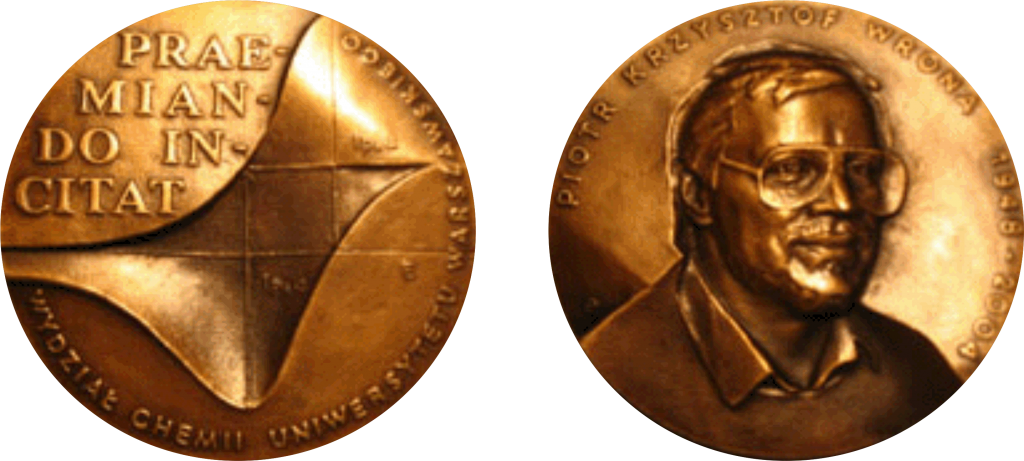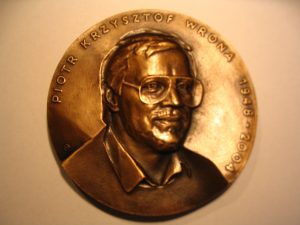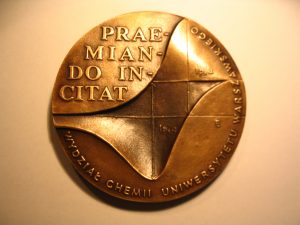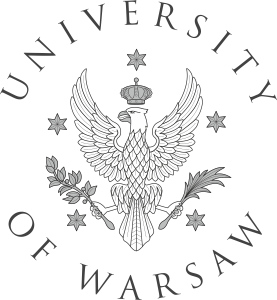Piotr Wrona Prize

Piotr Wrona Prize
The Prize was established in order to commemorate Professor Piotr Wrona, who was an outstanding inorganic and electro chemist and an excellent academic teacher of great service to the Faculty of Chemistry. Not only was he a scientist with extensive interests but also a man of integrity and a friend of the youth.
The Prize is given to the best graduate of the Faculty or Master of Science who has completed individual studies curriculum (for example at College of Inter-Faculty Individual Studies in Mathematics and Natural Sciences – MISMaP) and has prepared their Master’s thesis at University of Warsaw Faculty of Chemistry. Three elements are taken into account while choosing the laureate: (i) quality of Master thesis, (ii) grade point average, (iii) commitment to scientific research and other forms of activities that indicate that the candidate has comprehensive talents and interests; candidate’s work for the Faculty and community is of great importance. Comprehensiveness of interests and commitment to affairs of the community of the Faculty characterised Piotr Wrona.
The Prize consists of a scholarship of at least PLN 2000 that is payable in one sum and of additional (since 2008) medal that was established for this occasion. As fas as it is financially possible, we make our best to award a prize every year.
Financial resources for the Prize come from donors (the donations are kept in bank account of University of Warsaw Foundation) in half and from the Faculty’s funds in half.


Faculty of Chemistry is very grateful for all the donations made so far. We kindly request for your donations in the future.
Payment details:
Fundacja Uniwersytetu Warszawskiego
Krakowskie Przedmieście 26/28, 00-927 Warszawa
Account nuber: 30 1020 1156 0000 7502 0008 7213
(PKO BP SA XV O/W-wa)
please state as reference: z przeznaczeniem dla Wydziału Chemii / Nagroda Wrony.
Since University of Warsaw Foundation is a public service organisation (KRS number: 0000218937) it is possible (i) to make donations as 1% of income tax (until the day of filing tax report for the previous year), (ii) to make donations that can be deducted from the income (by the rules for donations during the whole accounting year), (iii) to make any other donations that do not qualify for deduction (including donations from institutions). More information can be found on University of Warsaw Foundation website (www.fuw.pl/en) and at the Foundation’s phone number: +48 22 5520882.
Laureates:
2006/2007
Łukasz Zawadzki – he prepared his Master’s thesis entitled “Synthesis of bisprolinediamides with aromatic backbone and evaluation of their organocatalytic activity” under the supervision of professor J. Jurczak. He obtained a high grade point average (4.93) and he was engaged in the works of Faculty of Chemistry Student Government. He also studied pharmacy at Medical University of Warsaw.
Joanna Bąk – she prepared her Master thesis entitled “Comparison of the neutron and X-ray structural analysis of the crystal on the basis of the (NH4)3H(SO4)2 compound” under the supervision of professor K. Woźniak. Sha was greatly committed to Scouts and she also organised and taught extracurricular chemistry classes at schools. She was a doctoral student at the Faculty and she obtained her doctoral title in 2011.
2007/2008
Mateusz Donten – he prepared his Master’s thesis entitled “Investigation of the structure of binary thiol monolayers designed for immobilization of Cytochrome C by electrochemical,STM and Raman Spectroscopy techniques.” under the supervision of professor J. Bukowska. He showed great initiative while choosing institutions to broaden his knowledge (he finished several internships abroad) and he studied at University of Warsaw Faculty of Physics. He has a strong publication record and he is committed to popularisation of science. He obtained his doctoral title in 2013 at University of Zurich.
2008/2009
Joanna Juhaniewicz – she prepared her Master’s thesis entitled “Synthesis of the thiolated peptides derivatives and their self-assembly on the gold electrode” under the supervision of dr Sławomir Sęk. She obtained high grade point average and she was greatly committed to community service at the Faculty, including her work in the Scholarship Committee. She was a doctoral student at the Faculty and she obtained her doctoral title in 2013.
Jan Stanek – he prepared his Master thesis: “The iterative algorithm of Discrete Fourier Transform for randomly sampled multidimensional NMR spectra“ under the supervision of dr hab. W. Koźmiński, prof. UW. The thesis was graded very highly as it was considered a creative and extensive solution for a difficult research objective. The laureate also obtained very high grade point average. He is currently a doctoral student at the Faculty.
2009/2010
Sebastian Wojtysiak – he prepared his Master’s thesis entitled “Designing of new catalysts for ethanol electrooxidation in fuel cell” that included both experimental and theoretical work under the supervision of dr A. Lewera. He graduated with honors. As a member of Student Government he was committed to community service both for the University and the Faculty. He is a co-founder and an active member of “Fulleren” Science Club. He also taught classes for the youth and did community service outside the University. He is currently a doctoral student at the Faculty.
2010/2011
Joanna Jankowska – she prepared her Master’s thesis: “The complex HXeF ··· HF – the correlation and relativistic effects” under the supervision of professor J. Sadlej and she graduated with honours in only 4 years (within the College of Inter-Faculty Individual Studies in Mathematics and Natural Sciences). She obtained the highest score in the admission procedure for doctoral studies at the Faculty. She is also a student at University of Warsaw Faculty of Physics. Moreover, the laureate attended conferences and internships and she was both scientifically and socially active – among other things she was on the board of a science club.
2011/2012
Kamil Strzelak – he prepared his Master’s thesis entitled “Multicommutated flow system for the determination of phosphoesterases’ activity” under the supervision of dr Ł. Tymecki in the research group of professor R. Koncki. He graduated with honours and after his graduation he was admitted for University of Warsaw Inter-Faculty Interdisciplinary Doctoral Studies in Natural Sciences and Mathematics. During his studies he was scientifically active as evidenced by his publications and conference presentations.
2012/2013
Piotr Piotrowski – he prepared his Master’s thesis entitled “Nano- and micrometric pH sensors based on the SERS effect of 3-amino-5-mercapto-1,2,4-triazole” under the supervision of professor J. Bukowska. In his thesis he proposed a new innovative solution that enabled to miniaturise pH sensors and, as consequence, to measure pH in different parts of a cell. The thesis was graded excellent and the laureate graduated with honours. After the graduation he was admitted to doctoral studies at University of Warsaw Faculty of Chemistry and he is also a student at Faculty of Physics. He was scientifically active. For a couple of years he has been committed to Pueri Cantores Plocenses choir.
2013/2014
Krzysztof Bąk – he prepared his Master’s thesis entitled “Synthesis and complexation studies of new ligands for sulfate anion templated assembly of fluorescent catenanes” under the supervision of dr Michał Chmielewski. In his thesis he proposed an innovative solution for synthesis and complexation studies of complex formation agent derivatives of 1,8-diaminocarbazole that can be of used for sulfate anion templated assembly of fluorescent catenanes that have sensor properties. The thesis was graded excellent and the laureate graduated with honours (grade point average for second cycle studies: 4.85). He is a doctoral student at the Faculty and it should be noted that he obtained the highest score in the admission procedure for doctoral studies. He is committed to community service as he teaches extracurricular chemistry classes for high school students from II LO in Szczecin. He also helped organise workshops and internships at University of Warsaw Faculty of Chemistry Laboratory of Stereocontrolled Organic Synthesis for talented students of Polish Children’s Fund.
2014/2015
Kaja Fac – she prepared her Master’s thesis entitled “Using the S-alkylation reaction to gain new dinucleotide and oligonucleotide 5’ mRNA cap analogs” under the supervision of professor Jacek Jemielity. Her thesis was a part of a bigger research project whose goal was to develop an efficient, post-transcriptional chemical ligation of cap to mRNA. The author, among other things, optimised S-alkylation reaction of triphosphate residue of nucleotides, experimentally confirmed the structures of obtained compounds and tested their usefulness. The thesis was graded excellent and the laureate graduated with honours. She is currently a doctoral student at University of Warsaw Inter-Faculty Interdisciplinary Doctoral Studies in Natural Sciences and Mathematics and her supervisor at Faculty of Chemistry is dr hab. Maciej Mazur. She was committed to the works of “Nucleotyd” Science Club and she became its president. Moreover, she took part in Science Picnics of the Polish Radio.
2015/2016
Maciej Dzwonek – he prepared his Master’s thesis entitled “Gold clusters – properties and self-organization into layers on electrodes” under the supervision of professor Renata Billewicz and dr Agnieszka Więckowska. He developed various methods for gold nanoparticles synthesis, put them into practice and, what is more, he characterised the synthesised nanoparticles with the use of numerous modern experimental techniques. The laureate graduated with honours and it should be noted that he obtained one of the highest scores in the admission procedure for doctoral studies at the Faculty. He has obtained certificates with regard to, among other things, working with radioisotopes and good clinical practice. Moreover, ha was committed to community service at the Faculty and he taught classes at the Educational Centre for Blind Children in Laski.
2016/2017
Urszula Budniak – she prepared her Master’s thesis entitled “Thermal characterization of 2,6-diaminopurine monohydrate crystals” under the supervision of dr hab. Paulina Dominiak. The laureate successfully combined typically experimental and synthetic laboratory work with crystallographic structural research and using different chemical quantum models in order to fully describe the phenomena under study. She obtained first and second cycle degrees in both chemistry and biotechnology within the College of Inter-Faculty Individual Studies in Mathematics and Natural Sciences. She has graduated from Faculty of Chemistry with honours and she obtained very high grade point averages: 4.77 and 4.97 at first and second cycle studies. Since 2013 she has been a doctoral student at the Faculty. What is more, she is committed to community service at the Faculty as she teaches various classes and organises workshops for the youth. She also took part in numerous mass events whose goal was to popularise chemistry.
2017/2018
Joanna Macnar – she prepared her Master’s thesis entitled “Analysis of inhibitors – tRNA methyltransferases interaction using in silico and in vitro methods” under the supervision of dr hab. Dominik Gront. Not only did the laureate carry out advanced calculations using the methods of quantum chemistry, but she also used the methods of organic synthesis to experimentally obtain the compounds under study. She graduated with honours and she obtained very high grade point average (4.81). In 2017 she was admitted for doctoral studies within University of Warsaw Inter-Faculty Interdisciplinary Doctoral Studies in Natural Sciences and Mathematics and it should be noted that she obtained second highest score in the admission procedure. The laureate is a co-author of many conference presentations, she took numerous internships including those in leading research centres abroad. Moreover, she was committed to community service at the Faculty as she taught various classes and organised workshops for the youth. She also took part in numerous mass events whose goal was to popularise chemistry, including classes for children of Polish Children’s Fund. She also did community service in her home town Jarosławiec.

